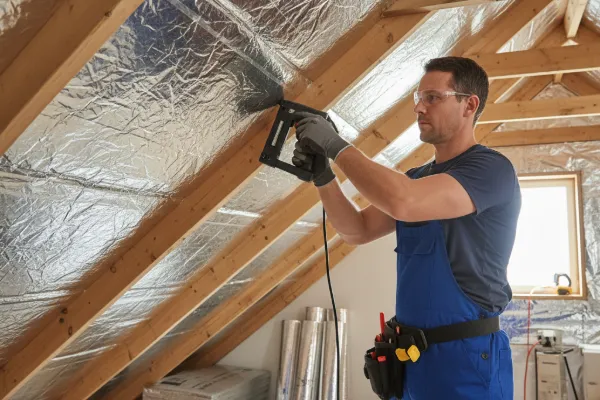
Radiant Barrier Insulation: Energy-Efficient Protection for Your Home
Energy costs are rising, and homeowners are searching for smarter, more efficient ways to keep their homes comfortable without overworking their HVAC systems. One solution gaining attention is radiant barrier insulation. Unlike traditional insulation that slows heat transfer, radiant barriers reflect radiant heat, keeping attics cooler and reducing overall energy consumption.
At BCP Inc., we provide high-quality insulation solutions tailored to maximize comfort, reduce costs, and extend building performance. Let’s dive deeper into what radiant barrier insulation is, how it works, and why it might be the upgrade your property needs.
What Is Radiant Barrier Insulation?
Radiant barrier insulation is a reflective material—usually made of aluminum foil—applied to surfaces in the attic, roof, or walls. Unlike fiberglass or foam insulation, which slows conductive and convective heat transfer, radiant barriers reflect heat energy away.
Key Functions of Radiant Barriers:
Reflect up to 97% of radiant heat.
Reduce attic temperatures by up to 30°F in summer.
Lower HVAC workload, improving energy efficiency.
Enhance indoor comfort year-round.
How Radiant Barrier Insulation Works
Heat moves in three ways: conduction, convection, and radiation. Traditional insulation targets conduction and convection. Radiant barrier insulation focuses on radiation—the primary source of heat gain in attics.
When the sun heats the roof, radiant energy travels into the attic. A radiant barrier reflects this energy back, preventing excessive heat buildup. This keeps attics cooler, reducing heat transfer into living spaces.

Benefits of Radiant Barrier Insulation
1. Lower Energy Bills
By reducing heat transfer, radiant barriers cut down on HVAC usage, leading to substantial energy savings during hot seasons.
2. Improved Indoor Comfort
Keeps upper floors cooler in summer and more consistent in temperature throughout the year.
3. Extended HVAC Lifespan
Less strain on heating and cooling systems helps avoid costly repairs and extends equipment life.
4. Eco-Friendly Choice
Energy efficiency translates to a smaller carbon footprint, making radiant barriers a sustainable building solution.
5. Versatility
Can be installed in new construction or retrofits, making it a flexible upgrade for both residential and commercial buildings.
Types of Radiant Barrier Insulation
Foil-Backed Sheathing
Installed under roof decking.
Ideal for new construction.
Radiant Barrier Foil Rolls
Stapled to rafters in attics.
Affordable retrofit option.
Spray-On Radiant Barriers
Reflective coating applied to roof sheathing.
Great for existing homes where foil isn’t practical.
Installation Methods for Radiant Barrier Insulation
Attic Installation (Most Common)
Staple foil barrier to the underside of roof rafters.
Maintain an air gap for maximum reflectivity.
Pair with soffit and ridge vents for airflow balance.
New Construction
Use foil-faced sheathing during roof installation.
Provides built-in radiant barrier protection.
Retrofit Applications
Roll radiant barrier over existing insulation.
Spray-on reflective coatings for hard-to-reach attics.
Pro Tip: For best performance, radiant barriers should always be installed with proper attic ventilation.
Common Myths About Radiant Barriers
“They replace insulation.”
False. They work best with traditional insulation, not instead of it.“They don’t work in cold climates.”
They can help reduce radiant heat loss in winter, though benefits are greater in hot climates.“Any foil material works.”
Only engineered radiant barrier products provide the right reflectivity and durability.
Applications of Radiant Barriers
Residential Homes – Attics, walls, and under-roof installations.
Commercial Buildings – Warehouses, metal buildings, office complexes.
Agricultural Structures – Barns, poultry houses, greenhouses.
Renovation Projects – Retrofits for older homes to boost efficiency.
Conclusion: Radiant Barriers = Smarter Energy Efficiency
If you’re looking to reduce energy bills, improve indoor comfort, and protect your home, radiant barrier insulation is a smart investment. When paired with proper attic ventilation and traditional insulation, it delivers long-lasting results for both homes and businesses.
At BCP Inc., we offer high-quality radiant barrier solutions designed for maximum durability and performance.
📧 Email: [email protected]
📞 Phone: 877-540-5678